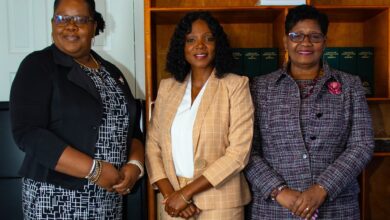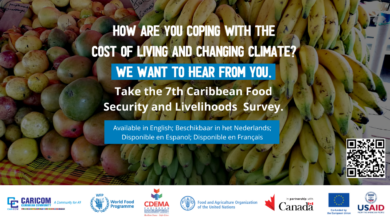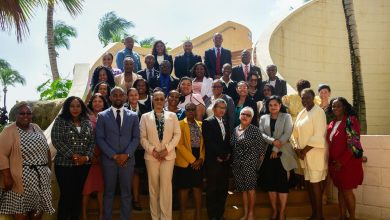(CARICOM Secretariat, Turkeyen, Greater Georgetown, Guyana) It is the duty of the Caribbean Community’s (CARICOM) Council for Human and Social Development (COHSOD) to provide strategic leadership in health and education in the face of the challenges posed by global crises.
This was the challenge laid down by the Honourable Rudyard Spencer, Minister of Health of Jamaica to his colleague Ministers of Health and Education as he delivered an address at the Opening Ceremony of the 18th meeting of the Council on Wednesday in Montego Bay, Jamaica. The two-day COHSOD brings together CARICOM’s Ministers of Health and Education in a joint session under the theme, Winds of Change: Education and Health Collaborating to Advance Human and Social Development.
Minister Spencer reminded the gathering of officials, representatives of regional and international institutions and ministers that the meeting was taking place as the world grappled with the crises of an economic and financial crisis and the spread of the H1N1 virus.
The Minister said even as the Region positioned itself to address the severe and wide-ranging impact of a global recession and the likely effect of the H1N1 virus, governments should invest more in areas, such as health and education, which would give the Region “a sustainable strategic advantage in an increasingly dynamic and competitive global marketplace.”
“I therefore challenge COHSOD to re-commit to one of its mandates, which is to promote the improvement of health including the development and organisation of efficient and affordable health services in the Community. The way forward must include the development of pro-poor health and education policies, a gendered approach to policymaking and strategic regional leadership in health education and health information,” Mr Spencer added.
Noting there was room for improvement in health education, the Minister alluded to statistics that pointed to Non-Communicable Diseases (NCDs) and injuries accounting for 69 percent of deaths in the Community and 65 percent of disabilities. This death rate, he said, was ten times that of the HIV/AIDS virus.
Jamaica’s Minister of Education, the Honourable Andrew Holness in welcoming the delegates said it was critical to ensure that health and education remained a priority for governments. He added it was important to improve efficiency, effectiveness and equity in both sectors.
Chairman of COHSOD, the Honourable John Fabien, Minister of Health of Dominica called on his Council to help make the case for the Heads of Government of the Community to take a long view of development and for moving to achieve the Millennium Development Goals by 2015 which should include a reduction in the rate of NCDs.
Dr Don Bundy, Lead Health and Education Specialist at the Human Development Network of the World Bank, with whose assistance the meeting is being held, cited the role of his organisation in the battle to ensure no diminution in the social sector in the wake of the economic and financial crisis. He said the Bank had disbursed US $800 million of a US $1.2 billion loan, credit and grant facility to those countries that were most vulnerable to the social shocks arising out of the crisis.
He said that meeting such as the COHSOD would give the Bank a chance to learn from the countries of the new challenges which had arisen as a result of the global crisis.
Chairman of the Opening Session CARICOM’s Assistant Secretary General Human and Social Development, Dr Edward Greene said this 18th COHSOD was the first in ten years which brought two areas together and he anticipated that the conclusions from the meetings would “take us along the road to producing the necessary human capacity to compete in the global arena.”
The Ministers meet separately on Wednesday before coming together on Thursday for the joint session. Following the COHSOD, the Ministers will meet with the Latin American counterparts on Friday and Saturday in preparation for a meeting of the United Nations Economic and Social Council (ECOSOC).
They will discuss priorities for dealing with the challenges of HIV, universal access to HIV prevention, care and treatment, the economic implications of HIV and the strategies for resource mobilization
That meeting, co-sponsored by the United Nations Economic Commission for Latin America and the Caribbean (ECLAC) and the World Health Organisation/Pan American Health Organisation (WHO/PAHO) is a follow-up to a Regional Forum held in Mexico in July 2008 on the role of education and health in HIV and will set a common LAC framework to be advocated at the ECOSOC Annual Ministerial Review in September 2009 at the UN in Geneva.






